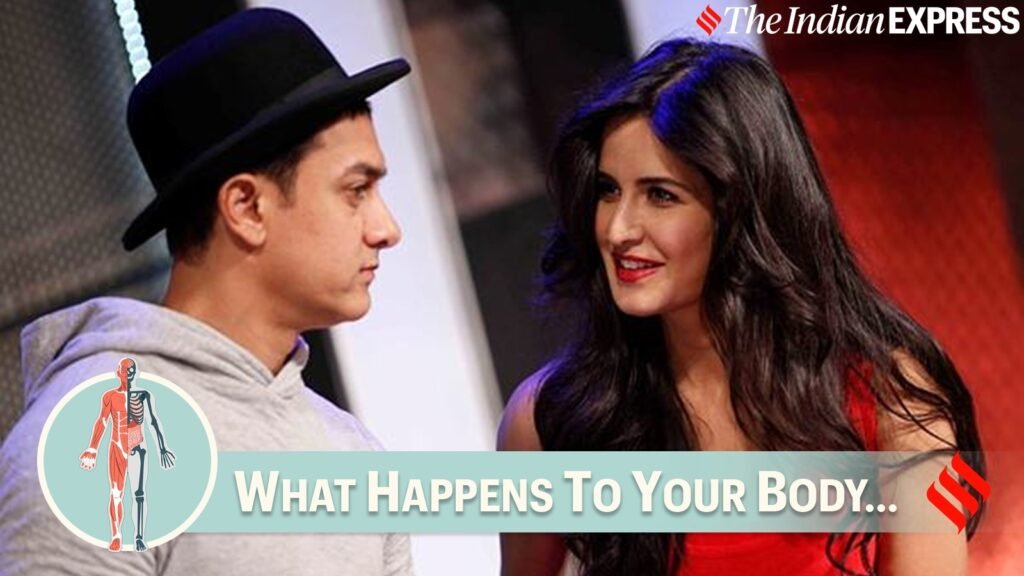What happens to your body when you eat only salmon and vegetables for a prolonged period? That’s the question that popped up after an amusing exchange between Kareena Kapoor Khan and Vicky Kaushal during a joint interview with The Hollywood Reporter.
The actors, both celebrating career milestones this year, candidly spoke about food habits and fitness — Kareena’s love for parathas and Katrina Kaif’s intense diet during her Dhoom phase. “These Punjabis, I have that gene yaar,” Kareena said, referring to her love for food. “I mean you and your wife, you don’t eat only. I think she’s made you like that. You’re also only eating salmon fish. Because there was a point when Kat was like I think only eating salmon, like that’s all she ate.” To this, Vicky responded, “Yeah, I think it was her Dhoom phase or something, where, I hear stories that Aamir and Katrina both were on just salmon and vegetables.”
Kareena also revisited her Tashan days, clarifying that her size zero look wasn’t fuelled by extreme dieting. “I did naa Tashan. But I used to eat paratha for breakfast during Tashan also. Yes, I was never on this orange juice size zero diet.” She then added, “So yeah, taper down through the day. But in the morning, you can eat a good breakfast and stuff.”
So, what are the potential health effects of eating only salmon and vegetables over an extended period?
Dr Anjana Kalia, ayurvedic doctor and nutritionist, Bloom Clinix, Dwarka, tells indianexpress.com, “Eating only salmon and vegetables can have short-term benefits, especially for weight loss and improved heart health. Salmon is rich in protein and omega-3 fatty acids, which support brain and heart function, while vegetables provide fiber, antioxidants, and essential vitamins. This combination may reduce inflammation and improve digestion in the short run.”
However, in the long term, Dr Kalia says that this restrictive diet can pose health risks. “The lack of food variety may lead to boredom, fatigue, and difficulty in maintaining the diet. Over time, consuming large quantities of fish like salmon may also increase the risk of mercury or other heavy metal exposure, especially if consumed daily without variety. A diet lacking in whole grains, dairy, fruits, and legumes could also compromise overall health.”
Could such a diet lead to nutritional deficiencies, even if salmon is rich in protein and omega-3s?
Dr Kalia states, “Yes, nutritional deficiencies are possible,” ading that while salmon provides high-quality protein, omega-3s, vitamin D, and B12, it lacks several important nutrients. “For instance, there would be very low or no intake of calcium (from dairy), iron from plant sources, vitamin E, iodine (unless iodized salt is used), and carbohydrates, which are the body’s primary source of energy.”
Vegetables add some variety in micronutrients and fibre, the expert notes, but they still cannot meet all nutritional needs. A lack of complex carbs may also cause low energy, dizziness, or muscle fatigue, especially in active individuals.
Story continues below this ad
How do extreme or highly restrictive diets like this affect metabolism and long-term relationship with food?
According to Dr Kalia, restrictive diets can slow metabolism over time. “When the body receives fewer calories or lacks macronutrient balance, it may go into ‘survival mode,’ reducing the rate at which it burns energy. This makes it harder to maintain or lose weight in the long term.”
Psychologically, she adds that such diets can lead to “disordered eating patterns.” People may begin to associate food with guilt or strict rules, making it difficult to maintain a balanced, sustainable eating routine later. Eventually, this could lead to binge eating or emotional stress around food choices.
DISCLAIMER: This article is based on information from the public domain and/or the experts we spoke to. Always consult your health practitioner before starting any routine.

